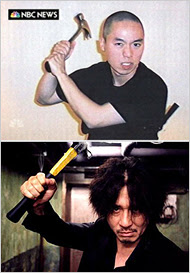 Steve Bryant at NewTeeVee has some interesting points on the Virginia Tech killings, although I don't like rewarding the QuickTime-using Oldboy-watching killer (as implied by Murdoch's Sky) by looking at him too much because he would barely talk to people around him. The segments I've seen seem like a message from one demon to another; more concerned with principalities and powers, not a settling of personal accounts.
Steve Bryant at NewTeeVee has some interesting points on the Virginia Tech killings, although I don't like rewarding the QuickTime-using Oldboy-watching killer (as implied by Murdoch's Sky) by looking at him too much because he would barely talk to people around him. The segments I've seen seem like a message from one demon to another; more concerned with principalities and powers, not a settling of personal accounts."The most important post-crime aspect of the Virginia Tech tragedy is that Cho Seung-Hei couldn’t conceive of the massacre without justifying it through media.
In the videos Cho mailed to NBC, he repeatedly refers to himself in the past tense. He has a meta-cognitive view of himself. In filming the piece, he was already looking at himself, postmortem, through the lens of the news. So in some ways you have to assume that, to Cho, the killing itself wasn’t the important thing. The important thing was imposing his ego on the world.
How appropriate, given that Cho thought the world imposed its ego on him. Cho’s video and photos were lifted from movies. The two gun pose, arms spread, straight out of Boondock Saints, or Snatch, or Layer Cake, or The Transporter, or any number of mainstream action movies. The hammer pose, straight out of Oldboy. In a very disturbing way, Cho was doing what the movies told him to do."
Read more of this story at NewTeeVee.
Update: from Glenn Greenwald,
'The expansion of the Surveillance State is endless. Buried within an ABC report on the Virginia Tech shootings is this paragraph (h/t reader DT):
Some news accounts have suggested that Cho had a history of antidepressant use, but senior federal officials tell ABC News that they can find no record of such medication in the government's files. This does not completely rule out prescription drug use, including samples from a physician, drugs obtained through illegal Internet sources, or a gap in the federal database, but the sources say theirs is a reasonably complete search.Is there any good reason whatsoever why the federal government should be maintaining "files" which contain information about the pharmaceutical products which all Americans are consuming? The noxious idea has taken root in our country -- even before the Bush presidency, though certainly greatly bolstered during it -- that one of the functions of the federal government is to track the private lives of American citizens and maintain dossiers on what we do.
If that sounds hyperbolic, just review the disclosures over the course of recent years concerning what data bases the Federal Government has created and maintained and the vast amounts of data they contain -- everything from every domestic telephone call we make and receive to the content of our international calls to "risk assessment" records based on our travel activities to all sorts of information obtained by the FBI's use of NSLs. And none of that includes, obviously, the as-yet-undisclosed surveillance programs undertaken by the most secretive administration in history.'
No comments:
Post a Comment